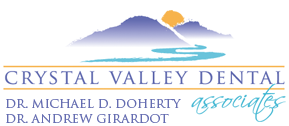Patient Forms
TMJ
CRANIOFACIAL OR TMJ DISORDERS
 |
If you suffer with headaches, dizziness, jaw fatigue, earaches, facial pain, difficulty in closing the teeth together, pain when chewing or neck and shoulder stiffness, it may be craniofacial or temporomandibular joint (TMJ) disorder. This is a jaw joint disorder that can be caused by a variety of factors. Pain complaints may involve the chewing muscles, the jaw joints, the jaws or even the teeth. Our office provides the latest in techniques for diagnosis and treatment of TMJ and craniofacial pain. Dr. Doherty is a Fellow of the American Academy of Craniofacial Pain (AACP). The TM joint connects the lower jaw (mandible) to your skull. It is all held together by muscles and ligaments. When everything functions properly, the lower jaw is in the correct position. When there is a problem, headaches, neck, facial pain and even upper back pain can be the result. Many times TMJ symptoms masquerade as many other conditions especially migraines. People may search for answers from many health professionals for years before learning that a specially trained TMJ dentist is usually the primary care giver in these cases. |
|
Symptom Checklist • Headaches Causes: Treatment: We believe strongly in conservative, non-surgical treatment for craniofacial or TMJ disorders. Unfortunately, if you ignore TMJ, it doesn't go away but only gets worse. The good news is that there are many non-invasive techniques for alleviating pain. Our focus is to address the jaw joint factors related to the pain by restoring proper function and improving overall health of our patients. TMJ Pain Explained |
|

